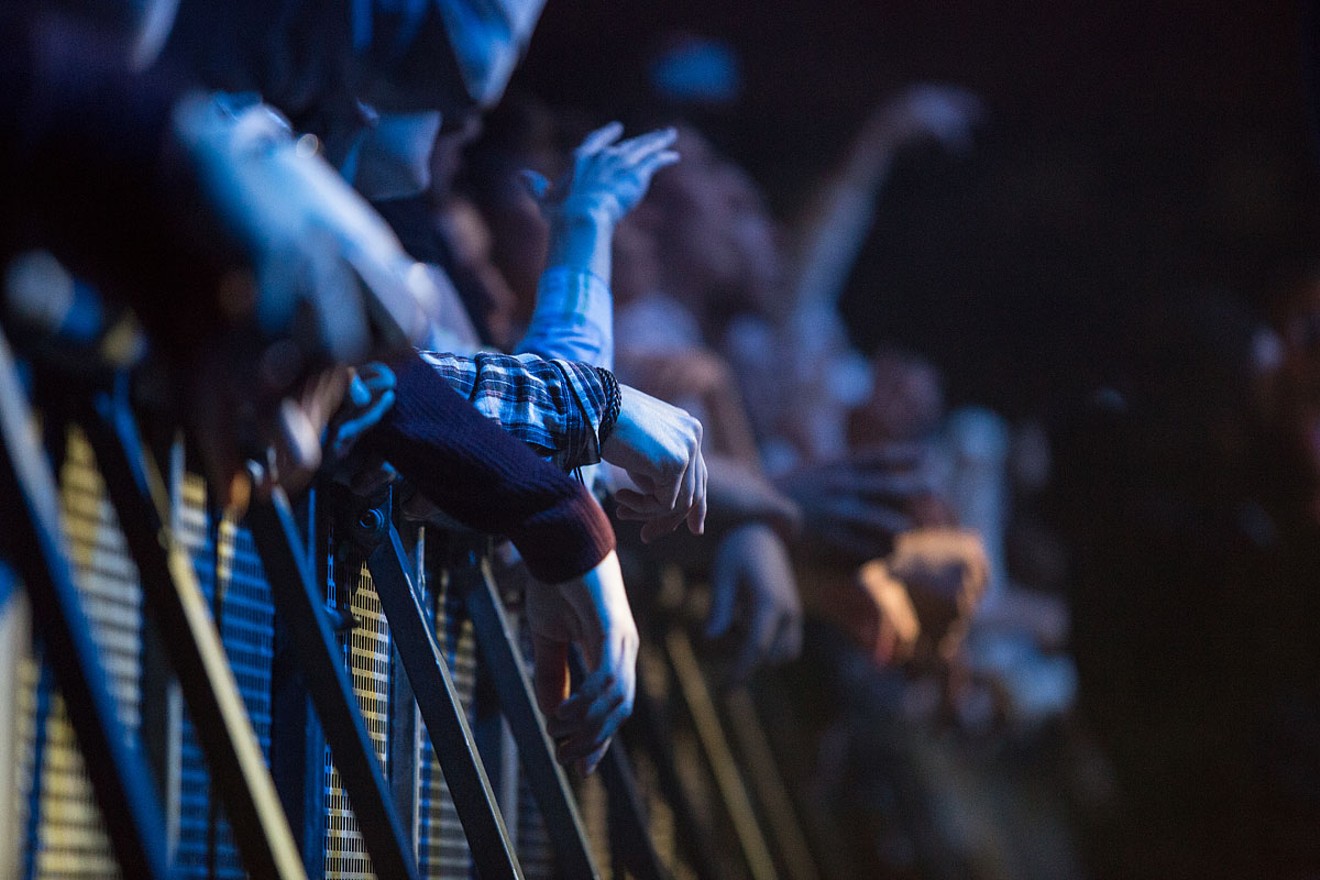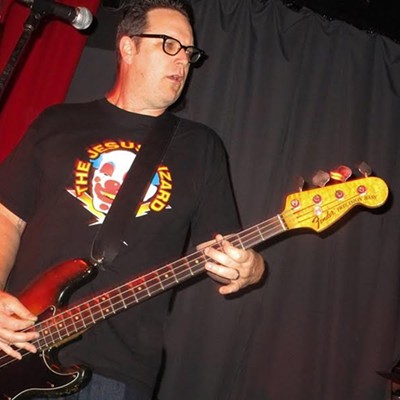Music lovers go to concerts to forget about the daily grind. Like going to the movies or attending sporting events, it's an opportunity to escape for a few hours and celebrate something you have in common with friends, family, and fellow fans. It's the temporary formation of a community where people dance, sing, laugh, and experience a spectacle together.
On Monday, May 22, in Manchester, England, Salman Abedi detonated an improvised explosive device as attendees were leaving an Ariana Grande concert at Manchester Arena. Twenty-two people died, and about 59 more were injured.
In the wake of the tragedy, both concertgoers and concert promoters have questions to ponder.
Do new safety measures need to be taken? And how can venues make sure they're making patrons feel safe? Because if they don't feel secure in public places, there's a good chance they'll opt to stay home instead.
New Times checked in with multiple Phoenix area venues to see if and how the Manchester bombing will affect security protocol. While there were expressions of sadness and sympathy for the victims and their families expressed by the representatives of the companies contacted, no one would specifically speak to any new measures that would be taken due to the nature of such security information.
In fact, no one would speak specifically about security protocols at all, because they didn't want to provide potentially damaging information to any potential instigators of similar acts of terrorism and/or violence.
So will changes take place to venue security policies? It may be too soon to tell.
Longtime Phoenix concert promoter Danny Zelisko of Danny Zelisko Presents offers some insight. “Honestly, at the end of all this, I don’t expect a whole lot to change," Zelisko tells New Times. "I think people are going to have to step up their games and be even more alert than they were [Monday]."
For live music fans, security measures like bag-checks and metal detectors are nothing surprising to encounter. Same goes for police presence, restrictions on items that can be brought into venues, and rules about what kind of bags attendees can carry.
Take, for example, a trip to Talking Stick Resort Arena.
Concertgoers walk past a small army of Phoenix police officers as they approach the arena. Some direct traffic, and others are plainclothes officers blending in with the crowd. Arena security direct them through metal detectors and take a look into any purses or bags brought into the arena. While representatives of the arena security team were unavailable for comment, regular visitors to arena events, including Phoenix Suns games, ice skating events, and concerts, understand. And significantly more often than not, they comply with the drill.
Talking Stick Resort Arena, Gila River Arena, and University of Phoenix Stadium post policies about bag sizes and water bottles, for example, on the internet and at various places around the arenas themselves. Each of these arenas also uses metal detectors.
University of Phoenix Stadium limits the size of purses to 4.5-by-6.5 inches, and any additional bag brought in must be clear. Even if it's a diaper bag. All fans entering are subject to a metal detector and/or a pat-down by stadium security.
This is also the case in Talking Stick and Gila River arenas, although the “clear bag” policy is not in effect.
However, Talking Stick does have a policy against bringing wrapped gifts into the arena, so any birthday gifts brought to a suite at a Suns game must be in a gift bag.
Water bottles (one per person) at 500ml in size or smaller are allowed in University of Phoenix Stadium, but not Talking Stick. Gila River Arena typically doesn't allow water bottles, but makes an exception during hockey games.
Gila River Arena marketing manager Gracie Pugliese expresses sadness and shock about the events in Manchester, but she's unable to give specific details about what, if any, changes will be made to Gila River Arena’s security protocols in the wake of the tragedy.
Midsize venues such as Marquee Theatre, Crescent Ballroom, and Celebrity Theatre use a combination of security measures.
It's not uncommon to see security guards at venues like the Marquee and Comerica use handheld metal detecting wands or a good, old-fashioned pat-down. The Crescent Ballroom and Celebrity Theatre security guards sometimes ask showgoers to remove everything from their pockets and allow a short “pat-down” to enter the establishment.
Such safety measures are factored into putting on a show.
“We have some pretty hefty security bills," Zelisko says, estimating security costs for a big event in the five-figure range. "It’s a cost of doing business. You have mass assembly here with the public and we have to make them feel safe and they have to be safe. It’s not a façade. We have to do that.”
One thing that seems to be a constant, no matter venue size, is the importance of communication.
Though Donny Johnson of Luckyman Events was reluctant to share security details, he did share some information about how things work at the Marquee Theatre, where at one point in the not so distant past, patrons were sometimes asked to remove their shoes before entering concerts. This is no longer required.
“We actually have a security meeting prior to every event to make sure everyone is on the same page," says Johnson, a longtime part of the Phoenix music scene. "And we have Tempe Police to all of our events at a substantial cost. However, that being said, it is the best money we spend. It’s always a great deterrent to those with bad intentions when they see a uniformed officer at the front doors."
The cost of security is significant, as there are multiple levels of protection to consider. Many venues, large and small, have surveillance equipment, in addition to security staff, to assist in keeping patrons safe. That's in addition to the aforementioned metal detectors and metal-detecting wands, which can costs hundreds of dollars each.
After promoting thousands of concerts, Zelisko's all too familiar with the associated costs.
“You have arena security that work pretty much every show around the perimeter," Zelisko says. "You have the internal security or peer group security, which is also known as the T-shirt security, and you have the police. I would say it costs in the neighborhood of $20,000 to $25,000 dollars for a big event."
Sadly, though, Zelisko knows even the highest possible security budget may not be enough to stop an event like the Manchester bombing from happening.
“The bottom line is that, yes, I think this will be a call to action to people to be even sharper, and we’ll ask the security people to be even that much more on the lookout, and you can hire all the people in the world you want, but if someone wants to do something stupid, especially with an explosive, look out," Zelisko says. "In the back of our minds, when anything like this happens, [it adds] to the pressure of just doing what it takes to put on a show, which is not easy, it’s a lot of moving parts."
[
{
"name": "Air - MediumRectangle - Inline Content - Mobile Display Size",
"component": "18478561",
"insertPoint": "2",
"requiredCountToDisplay": "2"
},{
"name": "Editor Picks",
"component": "16759093",
"insertPoint": "4",
"requiredCountToDisplay": "1"
},{
"name": "Inline Links",
"component": "17980324",
"insertPoint": "8th",
"startingPoint": 8,
"requiredCountToDisplay": "7",
"maxInsertions": 25
},{
"name": "Air - MediumRectangle - Combo - Inline Content",
"component": "16759092",
"insertPoint": "8th",
"startingPoint": 8,
"requiredCountToDisplay": "7",
"maxInsertions": 25
},{
"name": "Inline Links",
"component": "17980324",
"insertPoint": "8th",
"startingPoint": 12,
"requiredCountToDisplay": "11",
"maxInsertions": 24
},{
"name": "Air - Leaderboard Tower - Combo - Inline Content",
"component": "16759094",
"insertPoint": "8th",
"startingPoint": 12,
"requiredCountToDisplay": "11",
"maxInsertions": 24
}
]












